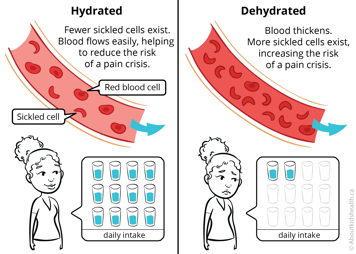Drinking enough fluids during the day helps to maintain good overall body health. For instance, water regulates your body temperature, helps flush waste products from your liver and kidneys, carries nutrients to your cells and helps prevent constipation.
When you have sickle cell disease, water is also extremely important for your blood flow. When your body does not have enough water, blood becomes thicker. Your body will also create more sickled cells, which makes a pain crisis more likely.

You probably know that your body needs a lot of fluids each day. The recommended adequate intake for teenagers is four to 12 glasses. The only way to reach this target is to drink regularly throughout the day.
An easy way to make sure you drink enough during the day is to carry a water bottle with you when you are outside your home and fill it at least twice.
Tip: You can experiment with water temperature and flavour to make it easier for you to drink more. Some people prefer ice cold water while others can drink more when it is room temperature or slightly warm. Others enjoy flavoured water, for instance by adding slices of lemon or cucumber, mint leaves or flavoured drops.
Aside from drinking regularly throughout the day, it is also important to eat at regular intervals. Have a set time for breakfast, lunch, an after-school snack and dinner. If you go too many hours without eating anything, your body will experience a drop in blood sugar, and you may notice that you feel dizzy and low in energy.
For more information on healthy eating and diet, see Diet and exercise in the sickle cell library.







